Make Fishing Fair is an initiative driven by small-scale fishers across Europe, spearheaded by LIFE, the Low Impact Fishers of Europe, and Blue Ventures. It is also supported by several civil society organisations engaged in nature regeneration and protection and advancing social justice. The initiative convened a consultation with 45 fishers from 17 European countries and supporters on 17 November 2025 in Brussels.
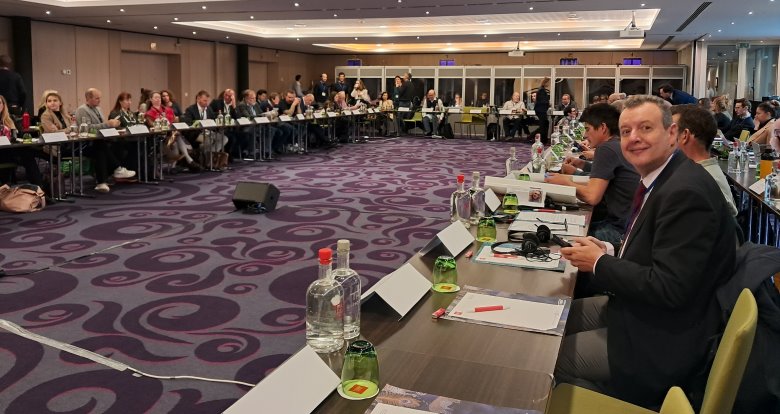
Awaiting the arrival of EU Commissioner for Fisheries and Oceans Costas Kadis
In preparation of the event, the fishers had developed a roadmap to achieve fair fisheries and support small-scale fishers (SSF) disadvantaged almost everywhere. The dire situation of the resources in European waters with catches down to 3.3 million tons in 2023, less than half of what they were a decade earlier according to EuroStat, has been brought about by a financial and policy focus on capital- and energy-intensive industrial fishing. Hardly any fishing quota were allocated in EU member states to low impact small-scale fishers. Therefore their landings accounted for less than 10% of the total, but create at least 50% of the jobs and 15% of the value. As Mundus maris and others pointed out repeatedly over the years: no fish means no fishers. Unsurprisingly, the numbers of small-scale fishers are shrinking with retirees barely replaced by young men and women. Yet, we all know that the future of fishing is selective, low energy passive gear that uses ecological knowledge of fish behaviour to harvest only as many adult fish as can regrow within a year, after allowing fish and entire ecosystems to regenerate themselves to former productivity.
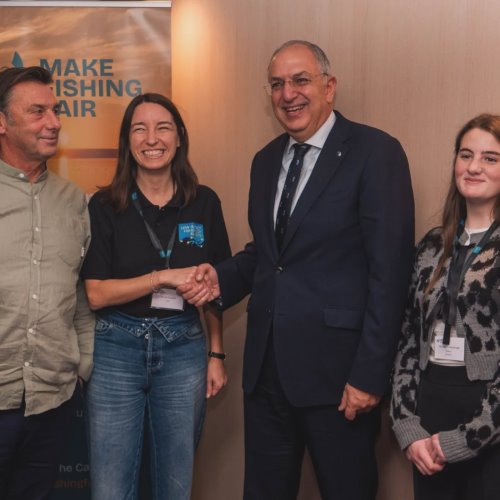
From left to right: Gwenn Pennarun, Association fes Ligneurs de la Pointe de Bretagne and LIFE, Marta Cavallé, LIFE, Costas Kadis, EU Commissioner for Fisheries and Oceans, and Muireann Kavanagh (IIMRO) (photo courtesy LIFE)
The fishers‘ Call to Action therefore demanded that the European institutions establish a Plan for Small-Scale Fishing in Europe by 2027. The plan must incorporate the principles of the Voluntary Guidelines for Securing Sustainable Small-Scale Fisheries as adopted by FAO’s Committee of Fisheries in 2014.
The top measures of the plan endorsed by the European institutions and the EU member states should entail the following:
- Restore fish stocks using better science and traditional knowledge to rebuild ecosystem health
- Protect SSF from competing impactful blue economy sectors by securing preferential access within the territorial waters, extending out to the six mile and 12 mile zone where appropriate
- Apply adaptive co-management systems in all coastal areas
- Ensure fair allocation of fishing opportunities based on social, economic, and environmental criteria
- Foster generational renewal by removing barriers and providing incentives, offering training, mentorship and decent livelihoods for young fishers
- Build resilient communities able to adapt to climate change
- Guarantee fair access to sectoral support and markets
- Promote gender equity by recognising women’s contributions and ensuring equal participation and opportunities.
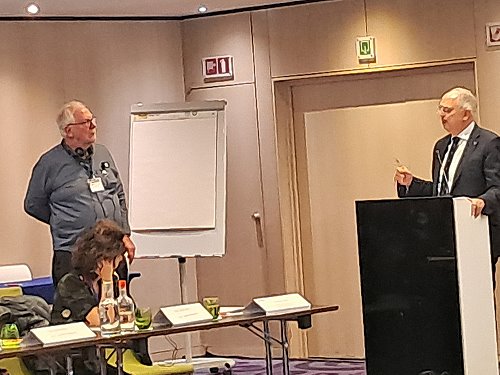
Jeremy Percy, Moderator, and Commissioner Costas Kadis
Commissioner Kadis acknowledged the many challenges including sea level rise, pressure on resources and more, especially after hearing the evidence of hardships explained by 16 year-old Muireann Kavanagh from Ireland and the plight of the line fishers in Britanny as described by Gwen Pennarun.
He cautioned there was no magic solution, but suggested, if properly applied the existing legislation could work. He expressed his concern about the alarming situation of the Baltic following the Council decision that did not follow the Commission proposals. He pleaded that consensus needed to be achieved for regenerate the Baltic as a matter of priority.
He also acknowledged that 82% of the fleet in the Mediterranean was small-scale and the more than 100,000 jobs needed to be safeguarded. The just published Vademecum of the Commission on quota allocations by national governments was a way to keep all parties engaged. The forthcoming dialogue meeting should identify favourable conditions for the EU’s small-scale fleet of more than 40,000 vessels shorter than 12 m. A call for evidence was going to be published shortly to prepare the Ocean Act in 2026. That was an opportunity not to be missed.
Several experience accounts from across the EU showed the diversity of contexts and the creativity of efforts to find locally adapted solutions, revive and modernise the best of traditions if only such efforts were not destroyed by political hurdles and starved of financial support where necessary.
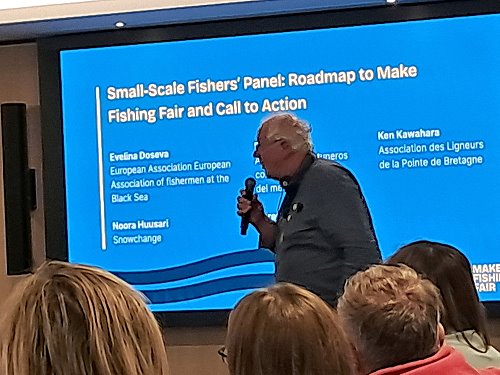 The panel of political and NGO representatives responded to a battery of questions from moderator Jeremy Percy that made it painfully clear that good proposals and initiatives had frequently run up against obstacles. It was almost beyond comprehension why technically, economically and socially advantageous initiatives had not been supported. As Bellinda Bartolucci, Senior Legal Adviser with ClientEarth, pointed out, it was disappointing that the Commission, as guardian of the Treaties, had not filed a single infringement process against member states failing to enforce existing law over extended periods, not only the Common Fisheries Policy, but also the Marine Strategy Framework Directive and the Habitat Directive.
The panel of political and NGO representatives responded to a battery of questions from moderator Jeremy Percy that made it painfully clear that good proposals and initiatives had frequently run up against obstacles. It was almost beyond comprehension why technically, economically and socially advantageous initiatives had not been supported. As Bellinda Bartolucci, Senior Legal Adviser with ClientEarth, pointed out, it was disappointing that the Commission, as guardian of the Treaties, had not filed a single infringement process against member states failing to enforce existing law over extended periods, not only the Common Fisheries Policy, but also the Marine Strategy Framework Directive and the Habitat Directive.
The rich conversations about the wide range of national and local experiences of small-scale fishers, the political and institutional processes and interaction with wider population groups showed foremost one thing: despite all the specificities of language, cultures, legal frameworks, and economics, fishers and their support organisations noticed the common ground and shared patterns. This is an excellent stepping stone towards finally applying the provisions of the Common Fisheries Policy and give priority to social, environmental and economic criteria in all decision making processes and develop co-management practice in regenerating the resource base and its responsible use.
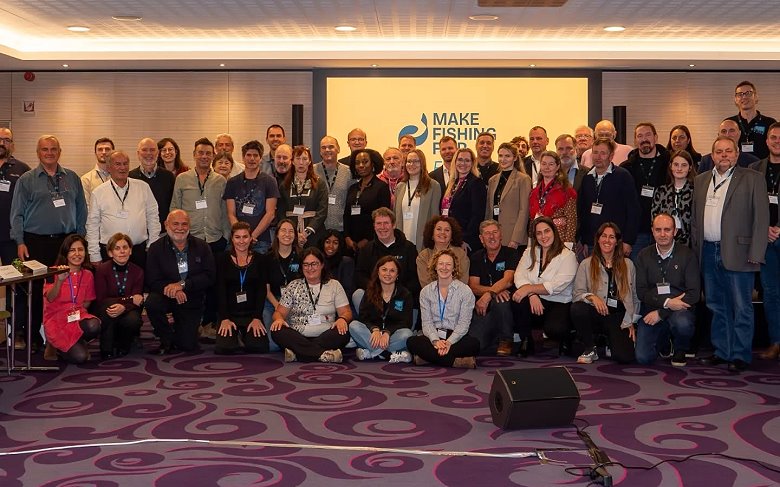
Photo courtesy LIFE
Mundus maris has supported small-scale and low impact fisheries since its beginning in 2010. In 2018, after years of individual action, together with men and women in artisanal fisheries from across Senegal, Mundus maris launched the Small-Scale Fisheries Academy in order to address their legitimate demands for fairness, respect and secure livelihoods. The inclusive dialogue based approaches of the SSF Academy lend operational support for the implementation of the Voluntary SSF Guidelines. Everybody is welcome to contribute their knowledge and experience from across SSF value chains and all other professions who are invited to joint learning and cooperation for celebrating local culture, healthy life in the ocean and responsible stewardship.
Learn more about the more than 30 small-scale fisher organisations across Europe who campaign for their future and healthy and prosperous coastal communities protecting the ocean and exercising stewardship. They are part of the global movement of small-scale fishers who must be central for ocean governance and food security. They forcefully claimed their place at the table during the UN Ocean Conference in Nice, June 2025. The movement is becoming more articulate across all continents and deserves all possible support. Kudos to LIFE and Blue Ventures for advancing the cause of making fishing fair in Europe.
Text and pictures by Cornelia E Nauen unless indicated otherwise.
handwerklichen Fischerei Akademie
- SSF and Environmentalists rethink fisheries together
- Make Fishing Fair
- Überfischung durch ausländische Fischerei verschärft Senegals tödliche Migrationskrise nach Europa
- Mundus maris at MARE 2025
- Handwerkliche Fischerei im Mittelpunkt von Meeresbewirtschaftung und Ernährungssicherheit
- Macht den Fischfang fair in der EU, 25. März 2025
- Beziehungen zwischen Mensch und biologischer Vielfalt über alle Skalen hinweg
- Weltfischereitag, gefeiert am 21. November 2024 in Nigeria
- Mundus maris participated in the 2024 World Fisheries Day organized by Canoe and Fishing Gear Association of Ghana (CaFGOAG).
- Beitrag von Mundus maris zur öffentlichen Anhörung zu UNOC3
- Gipfeltreffen zur Kleinfischerei in Rom, 5.-7. Juli 2024
- Regionales Symposium zur europäischen Kleinfischerei, Larnaca, Zypern, 1.-3. Juli 2024
- Baltic Fisheries Emergency Meeting, Brussels, 26 June 2024
- Ambivalent role of Market and Technology in the Transitions from Vulnerability to Viability: Nexus in Senegal SSF
- Shell fisheries as stewardship for mangroves
- Afrikanische Ausgabe des 4WSFC in Kapstadt, 21. bis 23. November 2022
- World Fisheries Day, 21 November 2023
- Webinar: Herausforderungen und Chancen der Fischerei in Nigeria
- Präsentation der FishBase-App auf dem Symposium in Tervuren
- MARE Conference on Blue Fear – Mundus maris reflects
- The Transition From Vulnerability to Viability Through Illuminating Hidden Harvests, 26 May 2023
- EGU-Veranstaltungen zum Thema Geoethik und gemeinsames Lernen
- Solidarität mit den handwerklichen Fischern in Senegal und Mauretanien
- The legal instruments for the development of sustainable small-scale fisheries governance in Nigeria, 31 March 2023
- Tools for Gender Analysis: Understanding Vulnerability and Empowerment, 17 February 2023
- Community resilience: A framework for non-traditional field research, 27 January 2023
- Sustainability at scale – V2V November webinar
- Europäische Ausgabe des 4WSFC in Malta, 12. bis 14. September 2022
- Beitrag von Mundus maris zum SSF-Gipfel in Rom
- Women fish traders in Yoff and Hann, Senegal, victims or shapers of their destiny?
- Die Akademie setzt ihre Arbeit in Yoff fort
- Illuminating the Hidden Harvest – a snapshot
- Virtual launch event FAO: International Year of Artisanal Fisheries and Aquaculture
- The Small-Scale Fisheries Academy as a source of operational support to PA Guidelines
- Welt-Fischereikongress, Adelaide, 20.-24. September
- Mundus maris unterstützt den Kampf von Paolo, dem Fischer, in der Toskana, Italien
- Catching-up – SSF Academy Yoff, 27 Febr. 2021
- Ausbau der Fähigkeiten der Akteure für eine nachhaltige handwerkliche Fischerei
- Testen von Trainingsmethoden während der Pilotphase der Akademie der handwerklichen Fischerei im Senegal
- Eine Premiere – Einweihung der Akademie der handwerklichen Fischerei in Senegal
